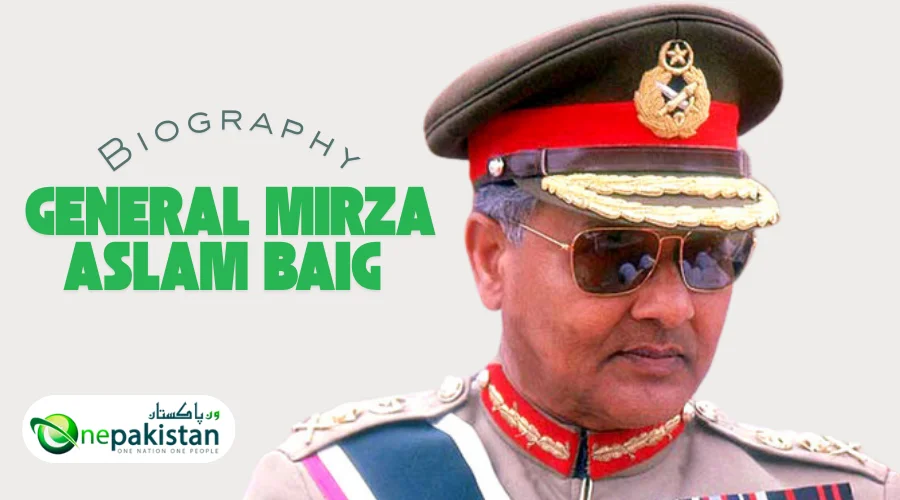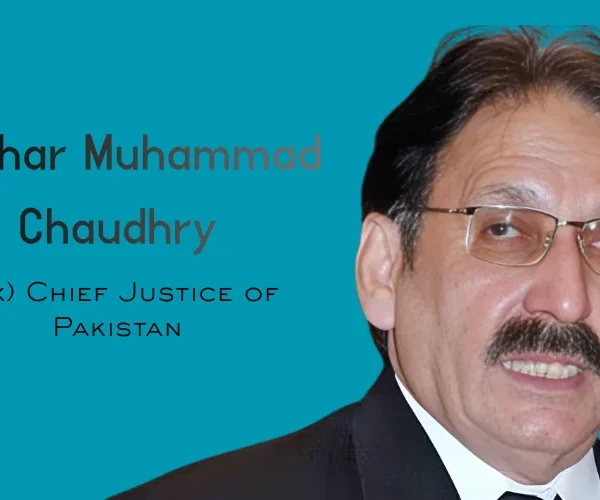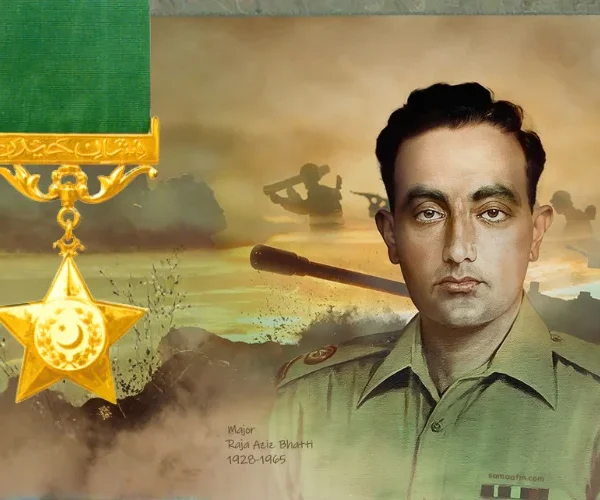General Mirza Aslam Baig is a retired four-star general of the Pakistan Army who served as the Chief of Army Staff from 1988 to 1991. He was appointed after the sudden death of General Zia ul Haq in a plane crash on August 17, 1988. During his tenure, Pakistan saw major political changes, including the rise of Benazir Bhutto and the return of democracy.
His career was marked by dedication, military reforms, and contributions to national defense. At the same time, he was also surrounded by controversies, particularly allegations of financing the Islamic Democracy Alliance (IDA). Beyond his military role, Baig was known as a teacher at the National Defence University (NDU) and as a writer who regularly contributed columns to newspapers.
| Attribute | Details |
|---|---|
| Full Name | General (R) Mirza Aslam Baig |
| Date of Birth | 2 August 1931 |
| Place of Birth | Muslimpatti, Azamgarh, India |
| Nationality | Pakistani |
| Family Background | Urdu-speaking Mughal Turk family |
| Education | Bachelor in Liberal Arts, Shibli National College; Master in War Studies, NDU |
| Military Service | Pakistan Army (1952–1991) |
| Unit | Baloch Regiment, Special Services Group (SSG) |
| Wars Participated | Indo-Pak War 1965, Indo-Pak War 1971 |
| Highest Rank | 4-star General, Chief of Army Staff (1988–1991) |
| Awards | Tamgha-e-Jamhuriat, 4 national medals |
| Notable Work | Iqtidar ki Majbooriyan (Limitations of Authority) |
| Post-Retirement | Professor at NDU, Columnist for The Nation |
| Retirement Date | 18 August 1991 |
Early Life and Family Background
Mirza Aslam Baig was born on 2 August 1931 in the small village of Muslimpatti in Azamgarh, India. He belonged to an Urdu-speaking Mughal Turk family whose ancestors had connections to the Mughal Empire from the 15th to 18th century. His father was a practicing lawyer and was well respected in the Allahabad High Court circle.
Growing up in a scholarly and disciplined environment, Baig inherited a sense of leadership and resilience. His family’s migration to Pakistan in 1949, soon after the partition, played a significant role in shaping his national identity. This move became the foundation of his lifelong commitment to serve the country through the Pakistan Army.
Education and Student Life
Baig began his early schooling in Azamgarh before enrolling in Shibli National College in 1945 for undergraduate studies. By 1949, he had earned a Bachelor’s degree in Liberal Arts. Alongside academics, he was deeply interested in sports, particularly field hockey, and became an active member of his college hockey team.
In his youth, Baig also displayed strong emotions towards politics. A notable incident occurred in 1949, when he reportedly clashed with a member of the Indian Congress Party in defense of a fellow Muslim teammate. This incident left a lasting impact on him and eventually influenced his family’s decision to migrate to Pakistan.
Also Read This: Altaf Hussain Biography, Age, Family, Net Worth & More
Military Career Beginnings
After migrating to Pakistan in 1949, Mirza Aslam Baig decided to join the armed forces. He enrolled in the Pakistan Military Academy (PMA) and became part of the 6th PMA course. He graduated in 1952 with a specialization in War Studies and was commissioned in the Baloch Regiment.
From 1952 to 1958, Baig served as a lieutenant in the regiment and performed exceptionally well. In 1958, he qualified for the Special Services Group (SSG) by passing rigorous physical and mental tests. He later went to the United States in 1960 to complete advanced special forces training.
On returning to Pakistan, Baig was promoted to Major and played an important role in the 1965 War against India, where his strategic decision-making earned him recognition within the Army.
Academic and Professional Growth
In 1965, Mirza Aslam Baig joined the National Defence University (NDU) to pursue higher studies and completed a Master’s in War Studies. His thesis work on military strategy added to his credibility as a rising officer.
After the 1971 War with India, he was promoted to Brigadier for his service. In 1975, he returned to NDU, this time as a professor of War Studies. His role as a teacher and instructor allowed him to share his knowledge with younger officers and shape the next generation of Pakistan Army leadership.
From 1975 to 1978, Baig continued to balance his academic contributions with his military duties. His time at NDU highlighted his ability to combine practical battlefield experience with academic insight, which became a hallmark of his leadership style.
Rise to Leadership
In March 1987, Mirza Aslam Baig was promoted to Vice Chief of Army Staff under General Zia ul Haq. After Zia’s death in a plane crash in August 1988, Baig was appointed as the Chief of Army Staff. His appointment came at a turning point in Pakistan’s political history, just before the 1988 elections.
As the Army Chief, Baig oversaw the country during the rise of Benazir Bhutto, who became Prime Minister and symbolized the return of democracy. Baig’s leadership style was different from his predecessors, as he supported democratic reforms while keeping the Army disciplined and active in national security.
Contributions as Army Chief
General Mirza Aslam Baig served as the Chief of Army Staff from 1988 to 1991, a period that was politically sensitive yet crucial for Pakistan’s military development. One of his major achievements was drafting the 1989 Gulf War plan, which reflected his understanding of international strategy and Pakistan’s regional role.
He also organized several large-scale military exercises that improved the operational readiness of the Pakistan Army. For his support of democratic reforms and smooth transition of power during Benazir Bhutto’s government, he was awarded the Tamgha-e-Jamhuriat (Medal of Democracy) in 1988.
Baig retired from service on 18 August 1991 after completing his tenure. He remains the only Pakistani General to hold four stars along with the Medal of Democracy, a rare recognition in the country’s military history.
Controversies and Criticism
Despite his contributions, Baig’s career was not free from controversies. The most serious accusation was his alleged involvement in financing the Islamic Democracy Alliance (IDA), a political coalition formed against the Pakistan People’s Party. These allegations created debates about the Army’s interference in politics during his tenure.
After his retirement, he often faced criticism in the media for his political statements and for being associated with decisions that blurred the line between civilian rule and military influence. While no formal charges proved his involvement, these controversies remain linked to his name.
Post-Retirement Life
After leaving the Army, General Baig remained active in academic and intellectual circles. He returned to the National Defence University (NDU) as a teacher of security and war studies, sharing his decades of experience with young officers.
He also became a well-known columnist, writing regularly for The Nation newspaper, where he discussed military strategy, democracy, and Pakistan’s role in global politics. In addition, Baig authored a book titled “Iqtidar ki Majbooriyan” (Limitations of Authority), which highlights the challenges of being in high positions of power.
His post-retirement career reflects his interest in knowledge, research, and public debate, even though his name continued to surface in political controversies.
Also Read This: Imran Ahmed Khan Niazi Biography
Awards and Recognition
During his service, General Mirza Aslam Baig received several honors for his contributions to the Pakistan Army and the country. He was one of the few officers to rise to the position of a four-star General and was awarded multiple national medals.
The most notable recognition was the Tamgha-e-Jamhuriat (Medal of Democracy), given to him by Prime Minister Benazir Bhutto in 1988. This medal symbolized his role in supporting democratic reforms during a sensitive period of Pakistan’s history. In total, he received four national medals, which reflect his professional dedication and long-standing military service.
Legacy and Impact
General Mirza Aslam Baig’s legacy remains mixed. On one hand, he is remembered for his military reforms, Gulf War planning, and contributions to Pakistan’s defense strategy. His time as Army Chief was also unique as it marked the beginning of a democratic era under Benazir Bhutto after years of military rule.
On the other hand, the IDA financing controversy and debates about the Army’s role in politics affected his image. Even after retirement, his political statements kept him in the public eye, making him a figure of both respect and criticism.
Despite the controversies, Baig’s career reflects a lifetime of service, knowledge sharing, and leadership in the Pakistan Army. His writings and academic work continue to inspire students of military history and security studies.
Final Words
General (R) Mirza Aslam Baig’s journey reflects the life of a soldier, teacher, and leader who played an important role in shaping Pakistan’s military and political history. From his early days in Azamgarh to his rise as a four-star General and Chief of Army Staff, he dedicated his career to serving the country.
Although his legacy is marked by both achievements and controversies, his contributions to war studies, military reforms, and democratic transitions remain significant. His career and writings continue to be a source of debate and learning for students of Pakistan’s military and political landscape.
Frequently Asked Questions (FAQs)
Q1: Who is General Mirza Aslam Baig
He is a retired four-star general of the Pakistan Army who served as Chief of Army Staff from 1988 to 1991.
Q2: When was Mirza Aslam Baig born
He was born on 2 August 1931 in Azamgarh, India.
Q3: When did he become Chief of Army Staff
He became COAS in August 1988 after General Zia ul Haq’s death and served until August 1991.
Q4: What is Mirza Aslam Baig’s book
His book is titled Iqtidar ki Majbooriyan (Limitations of Authority), where he shares insights about leadership challenges.
Q5: Why is he considered controversial
He faced accusations of financing the Islamic Democracy Alliance (IDA) and remained in the spotlight for political controversies after retirement.
Q6: What awards did he receive
He received multiple national medals, including the Tamgha-e-Jamhuriat, awarded by Benazir Bhutto in 1988.




